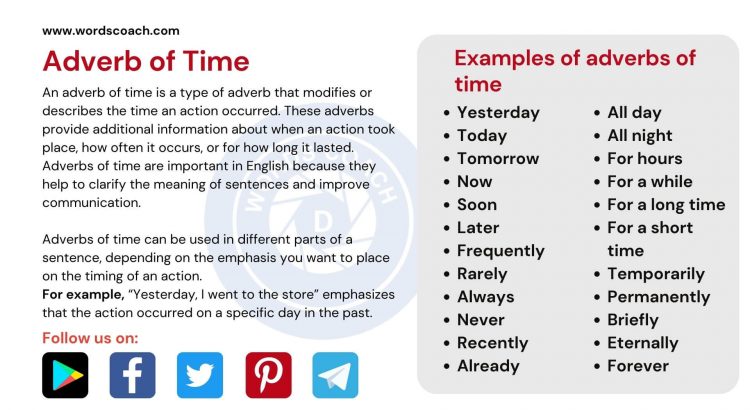Adverb of Time
An adverb of time is a type of adverb that modifies or describes the time an action occurred. These adverbs provide additional information about when an action took place, how often it occurs, or for how long it lasted. Adverbs of time are important in English because they help to clarify the meaning of sentences and improve communication.
Some examples of adverbs of time include:
- Yesterday
- Today
- Tomorrow
- Now
- Soon
- Later
- Frequently
- Rarely
- Always
- Never
- Recently
- Already
- All day
- All night
- For hours
- For a while
- For a long time
- For a short time
- Temporarily
- Permanently
- Briefly
- Eternally
- Forever
Adverbs of time can be used in different parts of a sentence, depending on the emphasis you want to place on the timing of an action.
For example, “Yesterday, I went to the store” emphasizes that the action occurred on a specific day in the past.
In contrast, “I went to the store yesterday” places more emphasis on the action itself, with the adverb providing additional information about when it occurred.
Adverbs of time can also be used in combination with other time-related words to provide more precise information about when an action took place.
For example, “I met her at 3 PM yesterday” provides a specific time frame for the action.
It’s important to note that some adverbs of time can be used to modify entire sentences, rather than just individual verbs.
For example, “Fortunately, the weather held up for the entire picnic” provides a time-related commentary on the overall event, rather than on a specific action.
Using adverbs of time effectively requires a good understanding of English grammar and syntax.
Here are some tips for using these adverbs correctly:
- Pay attention to the position of the adverb in the sentence. Adverbs of time can be placed at the beginning, middle, or end of a sentence, depending on the emphasis you want to place on the timing of an action.
- Use adverbs of time in combination with other time-related words to provide more precise information about when an action occurred.
- Be careful not to overuse adverbs of time, as this can make your writing sound repetitive or awkward. Use them only when they provide important information about the timing of an action.
- Remember that some adverbs of time can modify entire sentences, not just individual verbs. Use them in this way when you want to provide a time-related commentary on an entire event.
Examples of Adverbs of Time
Here are some examples of sentences that use adverbs of time:
- I will see you tomorrow.
- He is always punctual.
- I recently started a new job.
- She has already finished her homework.
- They have never been to Paris before.
- We usually eat dinner at 6 PM.
- I rarely drink alcohol.
- He is currently studying for his exams.
- I will call you back shortly.
- She has been sleeping all day.
- They are planning to leave soon.
- I just finished reading a book.
- He will arrive later tonight.
- We often go to the gym together.
- I have been waiting for hours.
- I occasionally listen to music while working.
- She has been living in New York City for the past two years.
- They were previously married but got divorced.
- He was momentarily distracted by a loud noise.
- We used to go to that restaurant all the time.
Adverbs of time are an important tool for improving communication in English. They provide additional information about when an action occurred, how often it occurs, or for how long it lasted. By using these adverbs effectively, you can make your writing more clear, precise, and engaging.
Download Words Coach: English Grammar

